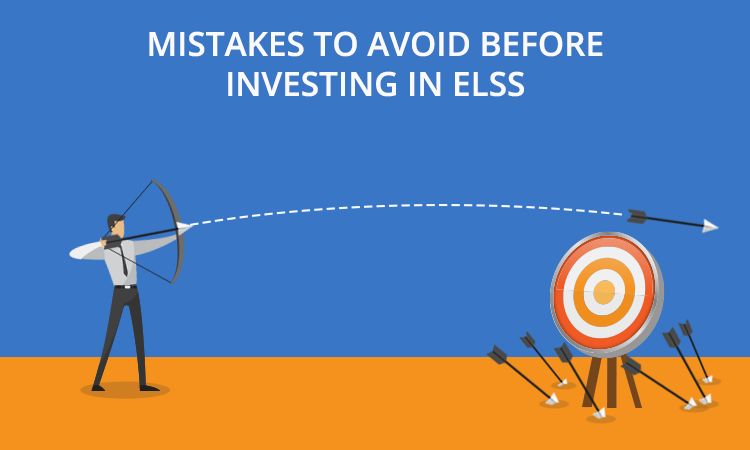10 Mistakes to Avoid Before Investing in ELSS?

ELSS Mutual Funds are the gateway to Equity Investments and by most measures; ELSS is the most favorable tax saving option. ELSS is uniquely advantageous compared to the other allowable investment options for mainly two reasons. Firstly, ELSS Mutual funds are the best viable tax-saving investment option within the Rs 1.5 lakh limit that brings the benefits of equity returns and secondly there's no other three-year lock-in product like ELSS that can be compared to other tax saving financial products.
Here is the list of 10 mistakes that investors should avoid:-
- Don’t begin late: It is always advisable to start investing as early as possible to maximize your returns. By starting investing early, time becomes your friend and this gives your fund more time to grow. Investing early also allow you to develop a disciplined spending habit by focusing on your budget and cutting expenses when needed. The best time is to start investing is in the early twenties or just after you start earning by SIP or STP.
- Don’t judge a fund based on short-term performance: It’s better to choose a fund which has been a consistent performer for over 3 to 5 years or over an extended period rather than a fund that has performed well only in the last 6 months! Note that Consistency is the Key.
- Don’t invest in ELSS in the (Financial) Year End: If you invest in the year-end for tax saving then there is a high probability that you have a taken a hasty and poor investment decision. You are forced to invest lump sum amounts that will not only lead to cash flow related problems but the investor will also have to face the risk of wrong market timing. It would be in the investor’s interest that he or she plans in advance and invest judiciously via a SIP.
- Do not invest only for Tax Saving: A good investment decision is always investment first and tax saving later. ELSS funds are market-linked; the returns are volatile and fluctuate over short periods. This makes ELSS quite a risky option, therefore, it is in investor’s interest that he should research thoroughly before making an investment decision. Investment decision should depend on the investor’s risk appetite, time horizon, and financial goal. If you cannot research yourself, leave it to the Financial Advisor.
 Read Related Blog: How to invest in Equity Mutual Funds under Volatile Market
Read Related Blog: How to invest in Equity Mutual Funds under Volatile Market - Don’t withdraw your funds just after the lock-in: Investors have the habit of pulling their money out once the lock-in period of 3 years is over. If you do so then you may simply lose, if the fund has been performing well consistently. To get decent returns from your investments in ELSS, you should stay invested for a period of 7 to 10 years.
- Do not switch funds every 3 years: Shifting from one fund to another fund every three years is a common habit among the investors, but not the right way to invest in Equity. You should switch only when your advisor tells you that the fund is underperforming and hence switching is an appropriate option.
- Do not choose Dividend over Growth: An advisor will never suggest Dividend option. So, never fall in the Dividend trap, because that money is paid from your own invested fund and the same money could have appreciated to create further wealth. So, if you want to grow your money choose Growth option rather than Dividend option.
- Don’t just stare at the Mutual funds Returns: Returns are the reason, why you invest in Mutual Funds. However, you should select a mutual fund whose investment philosophy matches your investment style. So, if you are a conservative investor invest in Debt Funds and if you are a risk-seeking individual invest in ELSS.
- Don’t invest in too many schemes: Too many cooks spoil the broth. Investing in ELSS funds every year will lead to over-diversification. You will also find it difficult to keep a track or review your own portfolio. This will cost you & cut down your profits.
- Don’t invest in ELSS without seeking a Financial Advisor advice: A Professional advice is a must for any investor. A Financial Advisor is essential because research before investment and review post investment is mandatory and a layman does not have time and upgraded market knowledge related to Mutual Funds. A Professional Advisor will first understand the financial goals of the investor and then give advice depending on his risk appetite, time horizon & financial Goals. So, a financial advisor is a must!